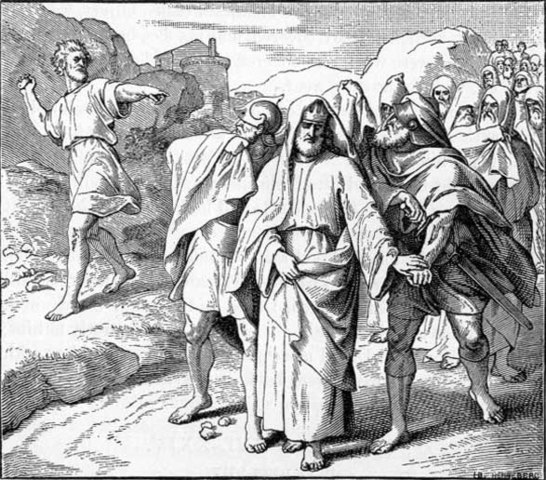
I’ve thought about how prayer and our responsibility work together for a long time. I first noticed this in the story of David fleeing Jerusalem when Absalom had stole the hearts of the men of Israel. One of the conspirators was Ahithophel, one of David’s wise counselors. As David flees the city, he gets word from someone that Ahithophel is in on this. David immediately prays in (2 Sam. 15:31), “O LORD, please turn the counsel of Ahithophel into foolishness.”
I suppose our understanding of prayer stops right there. That’s enough, right? The only addition we might make is to continue to pray the same thing. Certainly being persistent in prayer is right and good and sometimes there’s really nothing else we can do. But when something can be done, is that interfering with prayer? It could be but not always.
Soon after David prays for the counsel of Ahithophel to become foolishness, he meets another one of his wise counselors, Hushi. Here’s what he says to him: (2 Sam. 15:32-34) 32 While David was coming to the summit, where God was worshiped, behold, Hushai the Archite came to meet him with his coat torn and dirt on his head. 33 David said to him, “If you go on with me, you will be a burden to me. 34 But if you return to the city and say to Absalom, ‘I will be your servant, O king; as I have been your father’s servant in time past, so now I will be your servant,’ then you will defeat for me the counsel of Ahithophel.
At the end of 2 Samuel 16, we hear Absalom seeking counsel from Ahithophel. He advises him on how to defeat David the King. Absalom, though hesitant, allows Hushi to be his counselor as well. He asks Hushi what he should do concerning David the King. Here’s how they respond to the two options: (2 Sam. 17:14) 14 And Absalom and all the men of Israel said, “The counsel of Hushai the Archite is better than the counsel of Ahithophel.”
Why did they choose Hushi’s counsel over Ahithophel’s? Was it because David had prayed? Or was something else going on? Here’s what it says: For the LORD had ordained to defeat the good counsel of Ahithophel, so that the LORD might bring harm upon Absalom (2 Sam. 17:14b). So what’s the right answer? I think the prayer, the sending of Hushi and what the Lord had ordained work together.
There is some mystery here. There are some ways to answer this. But we know that James says that we do not have because we do not ask. And sometimes we ask for the wrong things. (Jas. 4:2-3) You do not have, because you do not ask. 3 You ask and do not receive, because you ask wrongly, to spend it on your passions.
I guess the point is, praying and waiting are not always the right response. We might ask if David’s prayer was answered and did God accomplish his ordained purpose in this? Here’s the answer: (2 Sam. 17:23) 23 When Ahithophel saw that his counsel was not followed, he saddled his donkey and went off home to his own city. He set his house in order and hanged himself, and he died and was buried in the tomb of his father.
What about Absalom? I assume you know how his life ended. But who gets their hair caught in a tree? That seems very ironic. (2 Sam. 18:9) 9 And Absalom happened to meet the servants of David. Absalom was riding on his mule, and the mule went under the thick branches of a great oak, and his head caught fast in the oak, and he was suspended between heaven and earth, while the mule that was under him went on.
As you know, Absalom was struck down and David was restored to the throne. Just consider that prayer and what God ordains are not opposed to one another (though they could be). In this story, they work together. And I’m aware that some will say that God ordained that David pray that way. Sure. I’m on board with that. But it’s not that obvious when David is fleeing the city and life is happening. I don’t think we have to say that. I don’t think David paused in the middle of all of that and acknowledged that God ordained that prayer. I don’t think he knew that at the time. He seems to hold out the possibility that God might do something else. I mean, why did he flee at all if he was certain of Absalom’s defeat?
I think this is how David thought about it: (2 Sam. 15:25-26) 25 Then the king said to Zadok, “Carry the ark of God back into the city. If I find favor in the eyes of the LORD, he will bring me back and let me see both it and his dwelling place. 26 But if he says, ‘I have no pleasure in you,’ behold, here I am, let him do to me what seems good to him.”
Pray and respond. Trust the Lord to do what is right and good. And sometimes that means we participate in that process that was ordained by the Lord.

Leave a comment